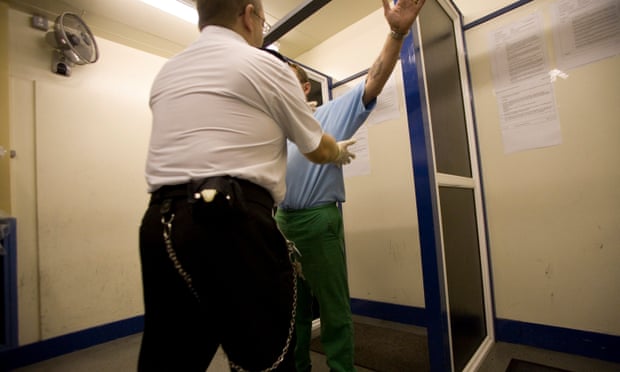http://www.theguardian.com/society/2015/aug/29/prison-amnesty-spice-drugs‘Spice’ drug amnesty to tackle violence epidemic in prisons A prisoner at Wandsworth is searched for drugs and weapons. Photograph: Antonio Olmos for the Observer
A prisoner at Wandsworth is searched for drugs and weapons. Photograph: Antonio Olmos for the ObserverGrowing fears that some of Britain’s jails are awash with spice – a psychoactive drug blamed for an increase in violence behind bars – have seen one of London’s oldest prisons introduce an amnesty under which prisoners can hand in the drug without fear of being punished.
This week HMP Brixton will conclude a month-long amnesty on spice and offensive weapons in an attempt to make the jail a safer place. A prisoner information notice shared with the Observer explains: “As you all know, HMP Brixton has suffered with an increase in spice as the drug of choice, and while this is reducing, we know the prison is not yet ‘spice-free’ as we would like to see it.”
Amnesty bins have been placed on prison wings for inmates to deposit the drug and any makeshift weapons. The prisoner information notice reminds inmates that, under the July 2015 Serious Crime Act, anyone in possession of an offensive weapon in prison is liable for up to a four-year sentence.
“Spice is a real problem for governors,” said Frances Crook, chief executive of the Howard League for Penal Reform, who described the amnesty as “a sign of utter desperation” on the part of prison authorities trying to tackle the effects of the former legal high, which was banned in 2009. “Nobody knows what is going to happen when you take them, so people get bullied into taking them and turned into an experiment.
“Some end up in hospital, which means prison staff have to do bed watches, take staff out and close wings because they are so short-staffed. There is a lot of bullying around them. People are asking to be put in solitary confinement as a protection. It’s causing havoc across the estate; it’s really problematic.”
Ministry of Justice has trained more than 100 dogs to detect new types of psychoactive substances
Earlier this month HMP Preston ordered an amnesty for drug users when a dozen inmates fell ill after taking a rogue batch of spice. In January, Nick Hardwick, head of the prisons inspectorate, said that spice had become the drug of choice in Britain’s jails.
His inspectors blamed it for an increase in the number of violent incidents, including two serious assaults, at a resettlement prison, HMP Blantyre House, in Kent.
The prison was described as “one of the jewels in the crown” after a 2010 inspection. But spice, which mimics the effects of cannabis but can cause paranoia, changed the culture of the prison.
The Prison Officers Association (POA) also blames the drug for a rise in violence among prisoners and attacks on its staff.
Inspectors who visited the young offenders institution at Stoke Heath published a report last month that found “levels of violence were high and there had been some concerning finds of weapons, but most incidents were low-level. Managers felt, and we agreed, that levels of violence were likely to be linked to the availability of alcohol and drugs, including new psychoactive substances”. A report on Wandsworth noted: “There had also been finds of hooch [illicitly brewed alcohol], ‘spice’ [highly potent synthetic cannibinoids that are potentially more harmful than cannabis but don’t show up in drug tests] and steroids.”
To combat the problem, the Ministry of Justice has trained more than 100 dogs to detect new types of psychoactive substances. It is also looking at developing body scanners to tackle the threat.
A Prison Service spokesman said: “It is wrong to suggest that HMP Brixton suffers from a weapons problem. But even one is too many and we will do all we can to remove them from our prisons. This amnesty is specific to HMP Brixton and is not country-wide. The amnesty is just one tactic being used as part of our zero-tolerance approach to drugs and weapons. We deploy a range of robust detection measures including using X-ray machines, drug-detection dogs and manual searches by staff to stop illegal items getting through. There are tough sentences in place for those caught with banned items.”
But Crook questioned the effectiveness of an amnesty and said drug problems in the prison estate were largely down to prisoners having little to occupy their time.
“An amnesty is a sign of utter desperation,” she said. “It’s a symptom of a much deeper malaise in the prison system. Prisons have to run on trust and consent and relationships. Only the ones where there is gross overcrowding, where there’s nothing going on all day and very few staff, are there problems that get worse and worse. It’s a downward spiral.”








